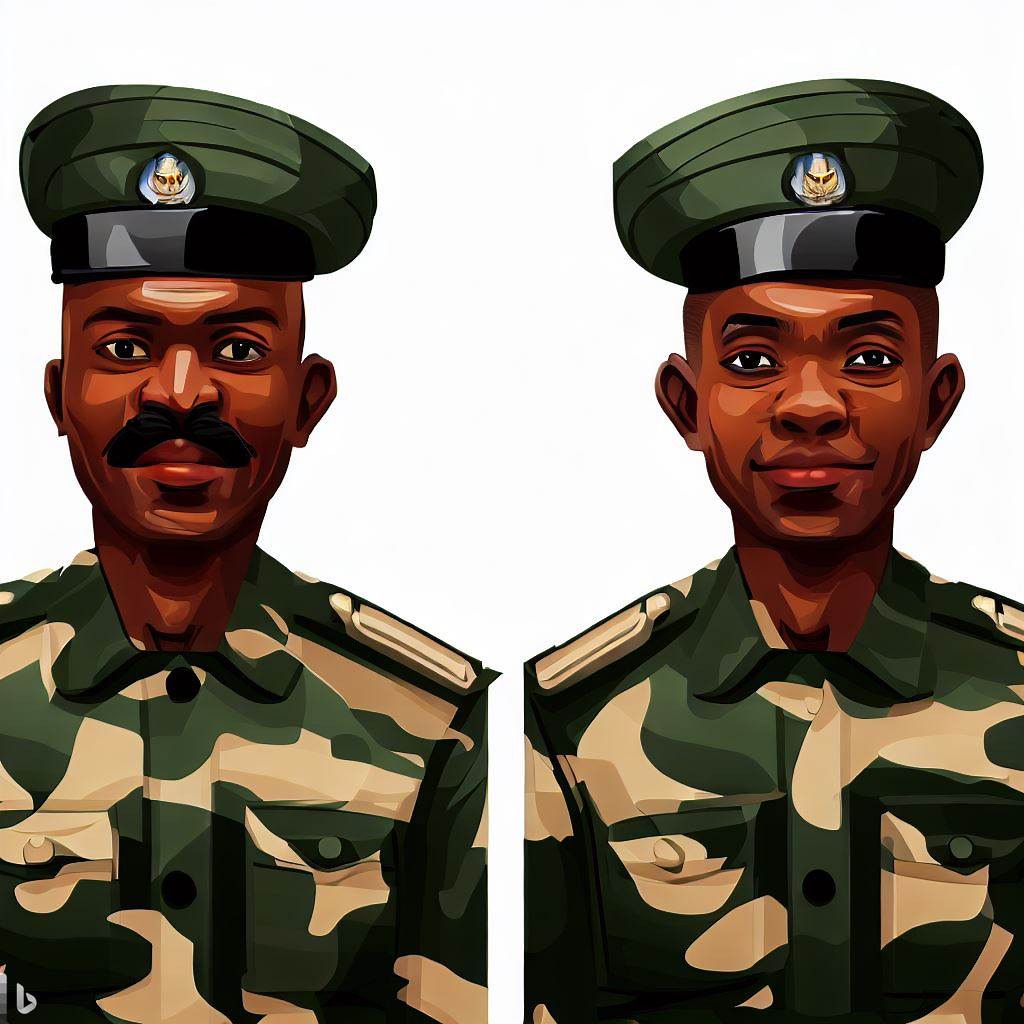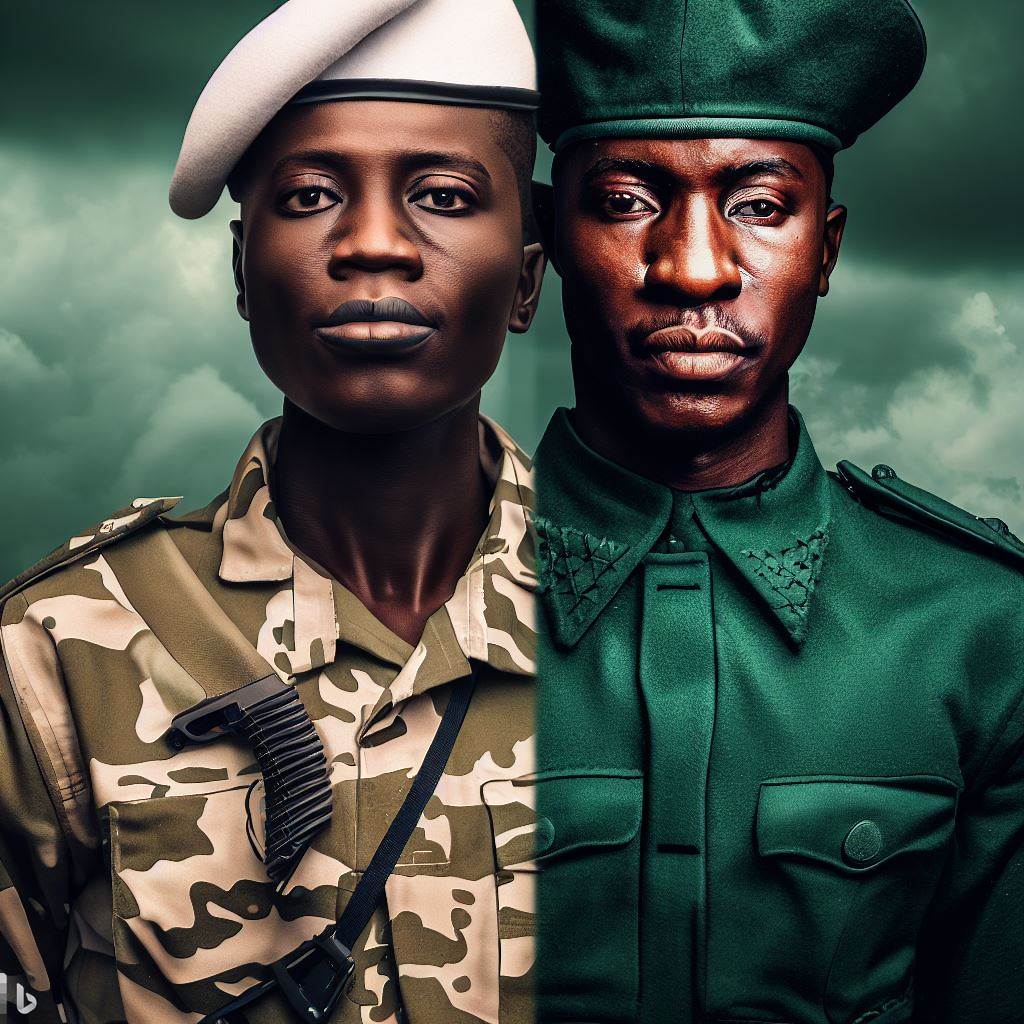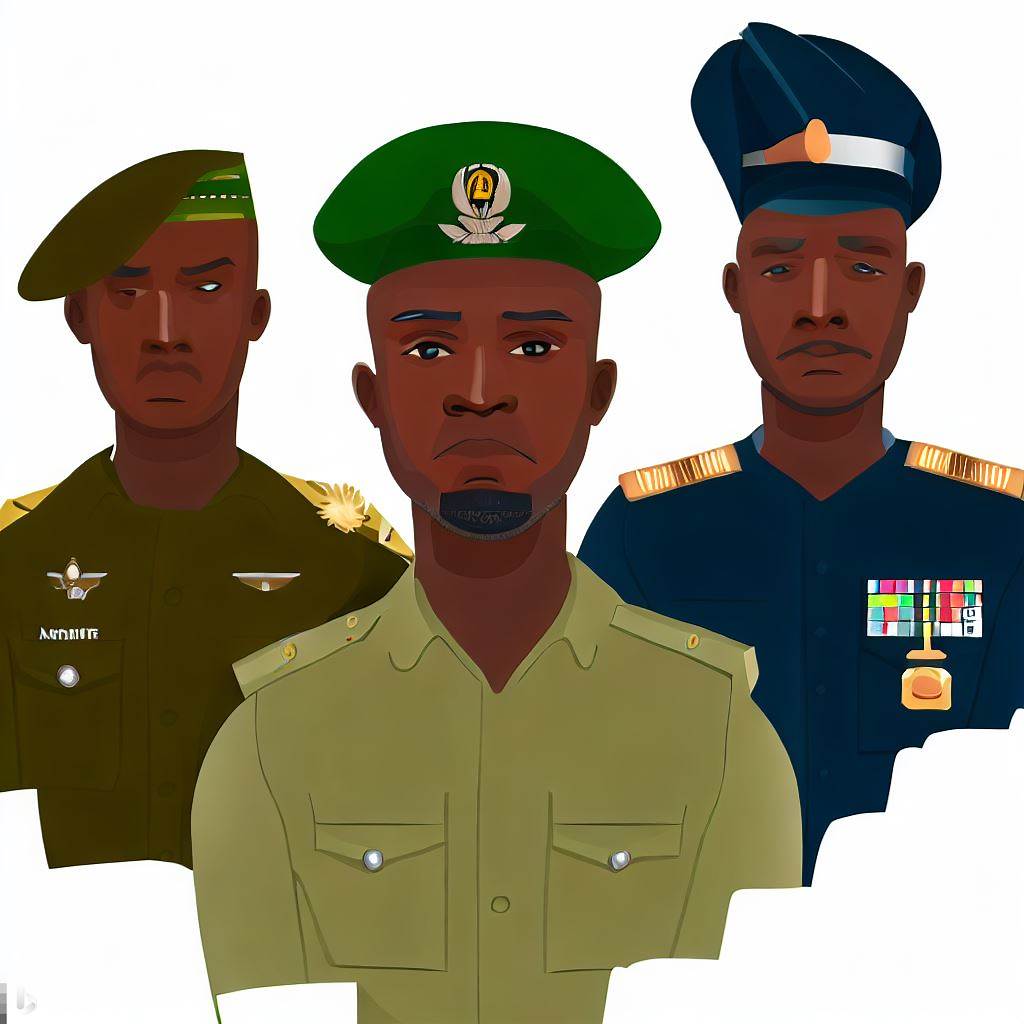Introduction
The Nigerian Military is the armed forces responsible for the defense of Nigeria. It is made up of the Army, Navy, and Air Force, with over 140,000 personnel.
The promotion structure within the Nigerian Military is significant because it ensures that deserving personnel are recognized and allowed to progress in their careers.
This structure is vital for sustaining discipline, morale, and motivation among the personnel. Regardless of the branch, the promotion process involves passing through several stages.
These stages include basic military training for recruits, officer cadet training courses, junior rank and non-commissioned officer training courses, and specialized training courses.
Promotion within the military is based on merit, qualification, and availability of vacancies. Still, it is also based on seniority and length of service.
Every rank has specific duties and responsibilities, and promotions come with increased responsibilities, authority, and rewards.
A thorough understanding of the promotion structure within the Nigerian Military is necessary for young officers and personnel to plan their career paths better and prepare for promotion exams and interviews.
Understanding the promotion structure will also help soldiers to anticipate their future positions within the military and be prepared to take on more significant roles and responsibilities.
Overall, the occupation structure makes the Nigerian military’s career path unique. Strict guidelines promote excellence and ensure a standard for the quality of personnel.
Read: The Nigerian Government: Achievements and Pitfalls
History of Military Promotions in Nigeria
Since the colonial era, the British Army managed promotions in the Nigerian Armed Forces.
After Nigeria gained independence in 1960, promotions became the responsibility of the Nigerian government.
Military coups impacted promotions; the 1966 coup led to promotions for junior officers.
The military leadership faced challenges balancing merit-based and seniority-based promotions, causing stagnation in leadership.
Efforts were made to establish a promotion structure based on merit and leadership evaluations.
Elements of the promotion structure include:
- Merit-based exams to assess knowledge and ability for promotions.
- Leadership evaluations to gauge leadership skills, communication, and decision-making under pressure.
Promoting diversity is a priority:
- Recruiting more women and minorities.
- Fostering cultural awareness and understanding among diverse groups.
Challenges persist, including corruption, nepotism, and concerns over personal connections influencing promotions.
Recent reforms aim to address challenges:
- Increasing transparency and accountability in the promotion process.
- Promoting diversity and inclusion within the military.
The history of military promotions in Nigeria shows progress and setbacks, with ongoing efforts for improvement.
Read: Duties and Responsibilities of Nigerian Military Officers
Current Promotion Structure in the Nigerian Military
The Nigerian Military is a vital institution for national security, and one of the critical components that determine the effectiveness of the military is its promotion structure.
Every military organization has its unique criteria for promotion, and the Nigerian Military is not an exemption.
This blog post will explore the current promotion structure in the Nigerian Military, including its ranking system, promotion criteria, promotion board system, and the pros and cons of the promotion structure.
Ranks and Titles
The Nigerian Military has a well-structured ranking system that determines the level of authority and command within the military hierarchy.
The ranking system begins with the lowest rank, which is the private, followed by Lance Corporal, Corporal, Sergeant, Warrant Officer, Master Warrant Officer, and the highest rank, which is the General.
Criteria for Promotion
The Nigerian Military has a specific criterion for promotion. Promotion is based on merit, qualifications, experience, discipline, and vacancies available in the higher ranks.
A soldier must be due for promotion, and the promotion must be approved by the respective authorities. Additionally, soldiers are expected to pass several promotion examinations before any consideration for promotion to the next rank.
Promotion Board System
The Nigerian Military uses a promotion board system to evaluate soldiers’ eligibility for promotion to the next rank. The board consists of high-ranking officers who assess the soldiers’ performance, discipline, experience, and other criteria.
The board also examines the soldiers’ leadership and management skills, which are essential qualities for higher ranks. The promotion board system is transparent, and the promotion list is published for everyone to see.
Pros and Cons of the Current Promotion Structure
Pros
- The ranking system is well-structured, and soldiers know what is expected of them to progress to higher ranks.
- The promotion criteria are fair and objective, ensuring that qualified individuals are promoted to higher ranks.
- The promotion board system is transparent, and soldiers can assess their eligibility for promotion based on their assessment and reviews.
Cons
- The promotion examination process can be subjective, leading to the promotion of less qualified individuals over better-qualified ones.
- The ranking system and promotion criteria may not adequately reward soldiers for exceptional performance and effort.
- The promotion board system can be influenced by nepotism and favoritism, leading to the promotion of individuals who do not deserve it.
The Nigerian Military’s promotion structure is a critical aspect of its success in national defense and security.
The current promotion structure is fair and objective, but there is still room for improvement by addressing the cons, especially the subjectivity of the promotion examination process and the influence of nepotism and favoritism in the promotion board system.
Overall, a structured promotion system is essential for maintaining a highly efficient and effective military organization.
Read: The Impact of the Nigerian Government on Daily Life
Possible Changes to the Promotion Structure
Call for Reform
The Nigerian military currently follows a promotion structure based on seniority and length of service.
However, many experts have called for the need to reform the promotion system to incentivize merit-based promotions rather than time-served promotions.
The current system has created a bureaucracy and a lack of morale within the military, and it is time to adopt a more modern approach to promotions.
Suggestions for Improvement
A potential solution is implementing a performance-based assessment system for promotions, requiring rigorous evaluation instead of guaranteed timelines.
Evaluations would be based on the skills, knowledge, and experience of each individual candidate, rewarding those who excel in their duties.
Another suggestion is to create career paths within the military that would allow for more diverse opportunities for promotions.
Currently, promotions are based on a linear path, but a more flexible structure that allows for cross-functional experiences would create leaders with a wider range of skill sets and experiences.
Potential Impact on the Military
The potential impact of introducing a new promotion structure could be significant.
By implementing a merit-based system, the military would be able to attract and retain the best talent, resulting in a more competent and professional workforce.
Additionally, the creation of career paths could lead to more specialized and capable leaders within different sectors of the military.
However, any change to the existing promotion structure would require careful planning and implementation to avoid any adverse impact. There is a risk of backlash from those who have served their time and are expecting a promotion, and it is important to consider their grievances when implementing any change.
In essence, the promotion structure within the Nigerian military is in need of reform.
A more merit-based system would not only incentivize high performance but would also create a more agile and resilient workforce through the creation of career paths.
However, any reform must be approached with caution and sensitivity to the current workforce to avoid any negative impact.
The Nigerian military needs to adapt to modern demands to remain competitive and effective in today’s ever-changing global landscape.

Challenges and Obstacles to Reform
The promotion structure within the Nigerian military has been a topic of discussion for many years. In recent times, there have been efforts to reform the system to make it more transparent and merit-based. However, there are still challenges and obstacles to overcome on this journey towards a better promotion structure. Some of these include:
Traditional resistance to change
One of the most significant challenges to reforming the promotion structure within the Nigerian military is the traditional resistance to change. Old habits die hard, and this is especially true when it comes to the military.
There is often a culture of doing things a certain way, and this is particularly evident in the promotion structure. Many officers are used to the status quo and may be hesitant to embrace change.
- One approach to overcoming this challenge is to provide education and training for officers to understand the benefits of a more transparent and merit-based promotion system. By highlighting the advantages of such a system, officers may be more willing to support reform efforts.
- Another approach is to involve officers in the reform process. By including them in the development of a new promotion structure, officers may feel more ownership and investment in the new system.
Existing power dynamics
Another obstacle to reforming the promotion structure within the Nigerian military is the existing power dynamics.
The current system allows for a select few to hold power, which can make it difficult for others to rise in the ranks.
Those who hold power may be hesitant to relinquish that power, making it challenging to implement changes that could level the playing field.
- To overcome this obstacle, it is essential to involve leaders at the highest level. By engaging with those in power and demonstrating the benefits of a merit-based system, leaders can be persuaded to support reform efforts.
- Moreover, it’s crucial to make sure the reform efforts are transparent and inclusive so that no one feels marginalized or left out of the process.
Political influence on promotions
In addition to traditional resistance to change and existing power dynamics, there is also political influence on promotions.
Nigerian politics is known for being characterized by corruption and nepotism, and the military is not immune.
Political connections can sometimes be the deciding factor in promotions, regardless of merit or skill.
- To overcome this obstacle, it is necessary to establish an independent body to oversee promotions. This body should be free from political influence and focused solely on merit and skill.
- Moreover, transparency is key. By making the promotion process more transparent, it becomes more difficult for politicians to sway decisions.
Reforming the promotion structure within the Nigerian military requires overcoming challenges and obstacles.
Traditional resistance to change, existing power dynamics, and political influence on promotions are among the obstacles that need to be tackled.
However, with persistence, transparency, and education, the military can move towards a more merit-based system that rewards officers for their skills and experience.
Read: Profiles of Heroes: Notable Nigerian Military Figures
Conclusion
Effective promotion structures are vital to the success of the Nigerian military.
Such structures provide the means to reward military officers based on merit and service.
Furthermore, it fosters loyalty and motivation to serve the country wholeheartedly.
It is important to note that the promotion process in the Nigerian military is not without its challenges.
There have been instances of favoritism, ethnicity, and corruption in the promotion process; these factors have the potential to undermine the effective functioning of the military.
Therefore, it is essential that the promotion process is continuously monitored for transparency and fairness.
Doing so will help in the identification of factors hindering effective promotions and measures to improve them.
It is noteworthy to mention that a promotion structure that reflects diversity and equal opportunities for all military officers will be crucial in fostering a sense of inclusivity.
In summary, an effective promotion structure in the Nigerian military cannot be overstated for the continued success of the country’s defense system.
It is essential to maintain a transparent promotion process by identifying gaps in the system and continually improving them.
With a fair and inclusive promotion process, the loyalty and motivation of military officers can only increase, making for a stronger and more efficient armed services.




